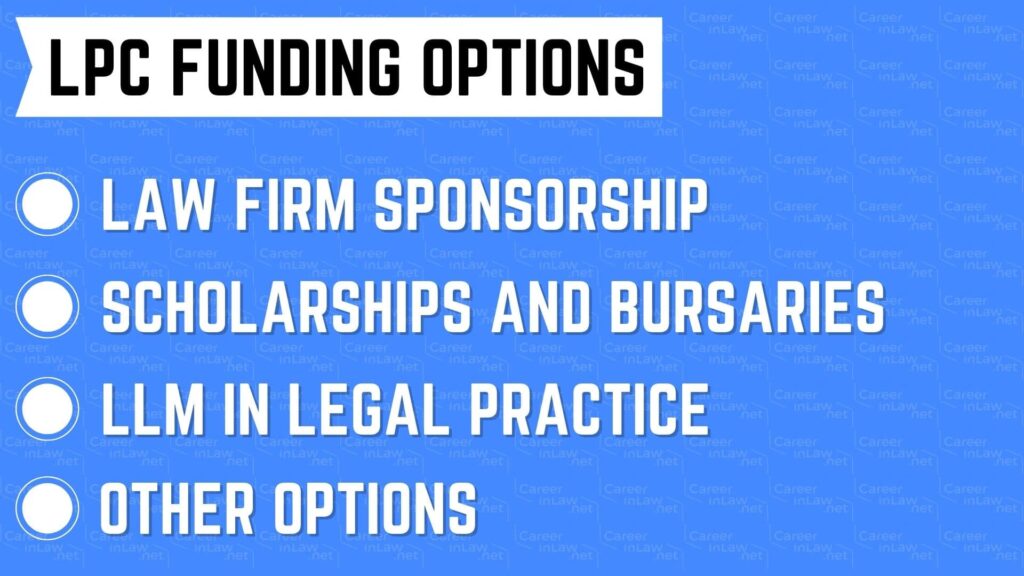Legal Practice Course (LPC) costs vary dramatically across the country. In general, your LPC costs will be anywhere between £7,600 to £17,500, depending on the location and university. Completion of the LPC is mandatory for anyone undertaking a training contract. However, you can only qualify as a solicitor through this route until 2031, after that, you will have to follow the Solicitors Qualifying Examination (SQE) route.
 LPC Funding Options to Cover LPC Costs
LPC Funding Options to Cover LPC Costs
There are various options available for law school graduates and non-law degree graduates to fund their further studies.
Law Firm LPC Sponsorship
If you receive a training contract offer from a medium or large-sized firm, they will most likely fund your LPC, and provide you with a maintenance loan or grant. You can ask the firm directly during their open days or email their graduate recruitment team.
Many firms fund the full course fees. However, some firms, such as Ashurst, offer partial coverage e.g., sponsorship of £8,000 (in London) and £7,000 (outside London). Consult our law firm overviews for more information on each law firm.
Maintenance grants tend to be around £8,000 (in London) but can go up to even £11,000, such as for trainees at Sidley Austin. Since living costs outside London are lower, some firms confer different grants depending on the location where the LPC is completed. Certain firms even offer maintenance loans, instead of grants, these would require repayment.
It is often that some firms require their trainees to take certain law courses to develop required practical legal skills and commercial awareness: These courses can be:

- Commercial law
- Business law
- Property law
- Criminal litigation
- Personal injury law
- Family law
- Commercial property studies
- International law
- Employment law
LPC Scholarships And Bursaries
BPP University and the University of Law both offer scholarships, awards, and bursaries on a need and/or merit basis. See the comparison between the two in our detailed review. You may apply for them after you have received an offer to study at the university. The application may include requirements such as evidence of academic performance, an online assessment, an interview/selection event, etc.
These differ based on eligibility, e.g., for international students, ULaw student bursaries provide a fee reduction of £1,000 for the LPC.
Other universities such as Nottingham Trent University and The City Law School also offer scholarships and awards for the LPC up to half or full fee of the course.
 Masters With Integrated LPC
Masters With Integrated LPC
If you study an LLM in Legal Practice you could be eligible for a postgraduate student loan. The loan would provide you with up to £11,222 for your living fees and other costs. You will not be eligible for the loan if this is your second Masters degree or if you do not fulfill the specified citizen/resident criteria.
Unfortunately, the LPC is a diploma and does not count as a Masters, thus, students studying the course without the LLM would not qualify for postgraduate loans.
Other Options to Cover LPC Cost
The Law Society offers a scheme with the intention to increase social diversity in the legal field. It is available to students from disadvantaged backgrounds and offers financial support in addition to work experience and a professional mentor.
Additionally, Future Finance loans is a big private student loan provider in the UK Loans range from £2,000 – £40,000, covering both tuition fees and additional costs of study. You would need to apply six months before you start your postgraduate course and check whether you are eligible.
If these options do not work out, you may choose to do the course part-time over two years and work during the LPC. Additionally, you can choose multiple installment plans to spread out the fee payments and plan when you can pay.
Remember to keep the deadline and eligibility criteria in mind when applying for scholarships, bursaries, and grants!
Things to Consider
Even before you start your Legal Practice Course, you must consider various things that will have an effect on your ability to pay for the LPC. You need to ask yourself:
- Would you prefer full-time courses or a part-time LPC course? Depending on how you choose to study, you might have more time to have a job that will allow you to have some side income to fund your LPC.
- Can you enroll in a diversity access scheme that may support your studies? Some schemes provide grants and bursaries which would ease your financial commitment.
- Will your career prospects after graduation allow you to cover the costs? Depending on your academic and professional background you may be able to secure a position that would allow you to pay off your loans much faster.
- Do you have to take the postgraduate diploma in law or diploma in professional legal practice before the LPC? If you must take any prerequisite courses before your LPC, then you will likely have to a much larger financial commitment to your education.
- Will you have to take any other courses for your professional examination? Even after finishing their LPC studies, some students may have to take further additional courses.
- Can you pass the English language requirements? If you are an international student, you must have a good understanding of English in order to be able to complete the course.
- Would you rather pursue the LPC or SQE qualification route? Until LPC is still a recognized qualification route, you have a choice between both. You can consult our guide to make the choice easier for you.
- Is your preferred route to a qualification recognized by the Solicitors Regulation Authority? Considering how many courses there are, you must do your research and make sure that you pursuing an official path to qualification as a solicitor in England & Wales.

